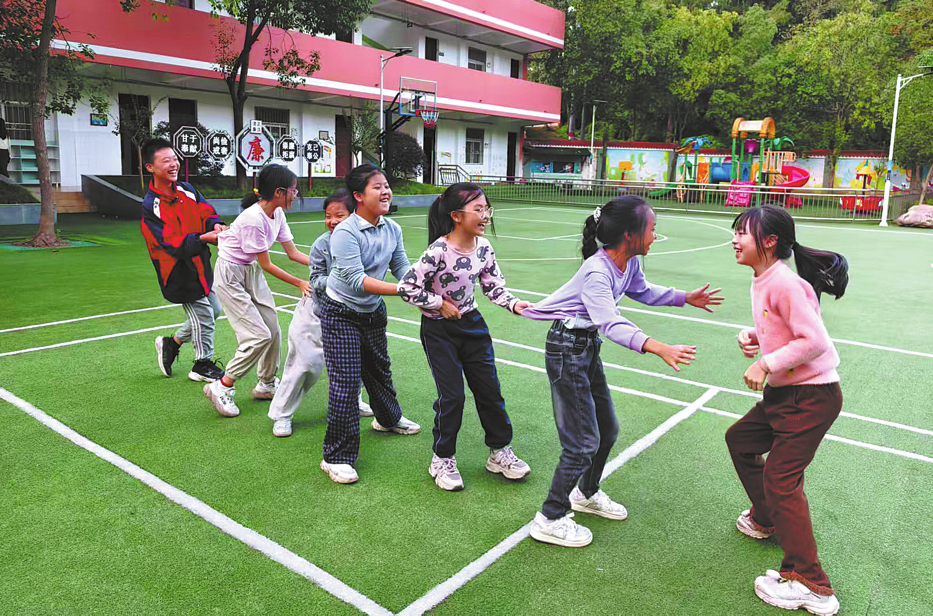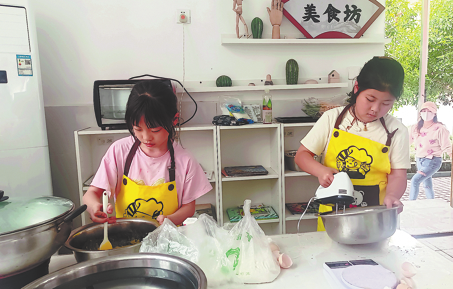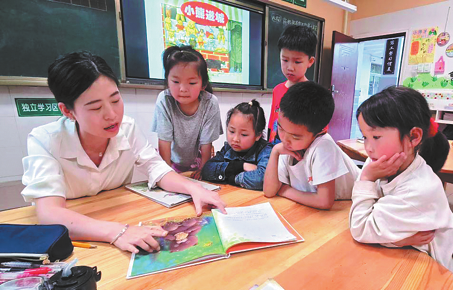School helps kids with more than just grades
Student-centered holistic development prompts families to move from major cities to rural primary in Sichuan


Fanjia Primary School's unconventional approach to children's education, focusing as much on personal, mental and emotional development as academic success, has attracted some parents from China's big cities to relocate their children away from the rat race to the school's more tranquil rural surrounds.
Nestled in the village of Fanjia in Guangyuan city, Sichuan province, the school's calling card and distinctive educational experience blends traditional academics with immersive nature-based learning.
Originally, the school primarily served local children, many of whom had been left behind by parents who'd left to work in cities.
However, on the back of news about the primary's educational approach, 38 of the school's 70 kids come from outside of the village with many hailing from big cities such as Beijing, Shanghai, Nanjing and Xi'an.
Last year, Zheng Min, a 40-year-old mother from Nanjing, Jiangsu province, made a life-changing decision to move her family to Fanjia village so that her two sons could attend the school. Her elder son, who is now 11, started fourth grade there, while her younger son, aged 8, began first grade. The move was motivated by a desire to find an educational environment that better suited their needs.
In Nanjing, her elder son attended one of the best public schools in their district. Despite this, Zheng noticed that he was losing interest in learning. "He was compliant, but there was no spark in his eyes," she said.
The intense focus on academics, with homework stretching late into the night and a constant stream of extracurricular activities, left him unenthusiastic, she added.
The large school set strict rules to maintain order among nearly 1,000 students. "While I understood the school's safety concerns, I felt this environment wasn't right for our son," Zheng said.
"My son isn't the type to excel in a highly competitive environment, where the focus is more on grades. In such a setting, students who naturally excel might receive positive feedback and thrive, but my son didn't get that reinforcement. I believe that in primary school, cultivating learning habits, motivation and interest is more important for my son."
Zheng and her husband wanted a different experience for their children, one that emphasized learning motivation and interest over test scores. Her younger son, who had started speaking later than usual, also needed a nurturing environment. "We realized that our previous high expectations weren't helping," she said.
After researching innovative rural schools, they were drawn to Fanjia Primary School's unique approach.
The villagers still practiced communal farming, a lifestyle Zheng found both rare and valuable. "The sense of community and connection to nature is something our children wouldn't experience in the city," she said. They paid 6,000 yuan ($844) yearly to rent a house there.
Since moving, Zheng has seen significant changes in her children. Her elder son now enjoys school and is eager to attend, even if his academic performance hasn't dramatically improved.
"He has completely changed now. He's eager to go to school and even rushes through dinner, asking me what time he can go back to school to do his homework. He truly enjoys being at school now," the mother said.
The school's "leave-it-blank" periods allow students to plan their activities, fostering independence and creativity. The children have ample free time to play and explore, with well-used playground equipment and a supportive, less structured environment.
Zheng appreciates the school's focus on holistic development. "The teachers, while perhaps not as skilled academically as urban educators, are deeply committed to the students' well-being," she said. Her younger son has made great strides in social and emotional development and communicates more openly about his school experiences. "He totally trusts his teacher who is also our neighbor and often hugs her," she said.
"I believe moving here was the right choice for our children at this stage. I think growing up in a rural environment is ideal for kids, especially during elementary years, as it allows them to connect with nature. I feel we might have realized this a bit late," she said.
Fanjia Primary School has transformed its rural setting into an expansive natural classroom. Students participate in hands-on activities such as exploring nearby caves, observing insects and crafting slingshots. The curriculum is set in the surrounding environment, with teachers guiding students in identifying wild plants and fruits. Through the approach, students have documented hundreds of illustrated nature journals.
During Teacher's Day this year, the school's principal hosted a feast for parents, teachers and students. "It was a genuine celebration, unlike anything in the city," Zheng said.
Regarding middle school, she focuses on living in the present. "We can't plan every step of their lives," she said. "We just need to ensure they are happy and thriving now."
Wu Wei, a 44-year-old university lecturer living in Beijing, transferred his 12-year-old son to the school this year. The decision to switch schools was primarily driven by Wu's desire for his son to grow up in a more natural and relaxed environment.
The previous school, with its heavy emphasis on student management, had made his son anxious.
Wu's flexible teaching schedule allows him to spend considerable time at the village, where he occasionally teaches art classes.
"In recent years, I'd noticed that his enthusiasm for learning, friendship with classmates, and his relationship with teachers at his previous school were not ideal," Wu said.
"When doing homework, he was less diligent, rushing through tasks. Once, his best friend reported him for bringing a small card to school, which left him confused about their friendship. The school doesn't allow toys in classrooms. The large number of students meant strict management, including a ban on running in the schoolyard."
He can play in the playground during breaks at the new school. Earlier, it was not allowed because the previous school had multiple floors, making it crowded and unsafe for students to go downstairs for a short break. Only during the physical education class were they allowed to use the playground, Wu added.
After arriving at the new school, Wu found his son became more outgoing. "He now even initiates conversations with the principal, who is approachable," Wu said.
Zhang Pingyuan, the principal, who has dedicated 36 years to teaching in rural schools, champions a student-centered education philosophy. He started working at Fanjia Primary School in 2014. "Many essential skills are developed through play, such as social interaction and interest in others. In class, teachers and students often sit in a circle. Grades are not ranked here. We focus on understanding and respecting each child," the 55-year-old said.
"When a student makes a mistake, we engage them in a thoughtful dialogue rather than resorting to punishment. This method, known as the five-step conversation method, fosters an environment where students feel supported and valued," he said.
He said that the steps are five questions — What's wrong? What do you think? What do you plan to do? What do you need the teacher to do? What kind of advice do you need from the teacher? Teachers ask and students answer. During the conversation, teachers will not blame or complain. In this way, the children feel that their teachers truly love and care about them, Zhang added.
In 2015, the school reformed its evaluation system to move away from solely relying on exam results. The school introduced the "Eight Merits Youth" evaluation form, which assesses students on a broad range of criteria, including reading, labor, and habits.
This allows students to set personalized growth targets.
"Children develop at different rates. Our goal is to help them grow without the pressure of competing against their peers," Zhang said.
At the school, students' test scores are not tied to teachers' performance evaluations. "Although terms like scientific and meticulous management might sound impressive, people cannot be managed with such precision. We can't mold children into exactly what we want them to be," Zhang said.
The school's innovative approach has not gone unnoticed. In August, Fanjia Primary School was awarded Sichuan province's first prize for Educational Development Reform Excellence Award, recognizing its pioneering educational model.
Zhang said that the school has acquired an additional 0.47 hectares of land adjacent to the school, with plans to start construction on new buildings this year. The school's future plans include expanding facilities and introducing middle school education.


Today's Top News
- Commerce minister urges US to increase areas of cooperation
- Strong demand for China's sovereign bonds signals global confidence
- Ministry urges Japan to 'maintain self-respect'
- Li: Forge closer ties with Zambia
- China seeks follow-up actions on Nexperia
- Xi: Emulate Hu Yaobang's spirit, style






























